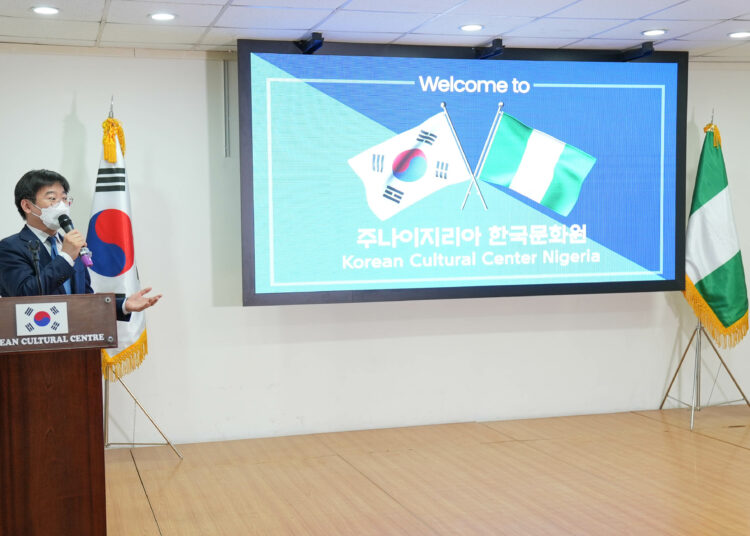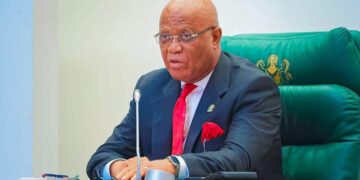Fifteen years after the Korea Culture Centre opened its doors in Nigeria, it looks forward to fostering new cultural collaborations with the country in film, literature, education and food.
Since its inception on May 24, 2010, the centre has been working to build a bridge between Korea and Nigeria through four key areas: culture, education, collaboration, and community-driven events.
Over the years, various efforts have successfully evolved into vibrant educational and cultural programs, including Korean popular music and dance (K-Pop) classes, Korean language (Hangeul) lessons, Taekwondo training, and school tours of the cultural center. These initiatives are complemented by annual cultural events such as the Korean Film Festival, K-Pop Festival, and the Hansik Cooking Competition. These programs are made possible through strong collaborations with local Nigerian and international partners—including Korean institutions and the diplomatic community—and are further amplified by a growing community of Korean culture enthusiasts. This passionate network includes GKS Scholarship alumni, Hallyu content creators, and honorary reporters, all working together to expand the reach and impact of Korean culture across Nigeria.
The centre witnessed over 300,000 learners, participants and visitors, at an average of 16,000 visitors annually, and hosted over 650 cultural programmes across the country.
However, as the centre forges into a second decade, it intends to explore new and potential areas of cultural collaboration—film, literature, and education.
“The reasons are apparent: Nigeria’s Nollywood ranks third in the global film industry for several films produced annually. Nigerian music producer JJC Skillz produced the first-ever English-Korean language (absurdist) movie, ‘ My Sunshine Movie’. Second, Nigeria and Korea share a literary affiliation – Nobel Laureates of Literature – Wole Soyinka and Han Kang were the first to receive the award in their respective continents of Africa and Asian continents. Finally, we aim to strengthen people-to-people relations by making more Korean content available to Nigerians beyond Lagos, Abuja, Ibadan, Abeokuta, and Port Harcourt.
“Back in the day, it was all about K-pop and K-drama. Nowadays, it’s about Korean food (Hansik). I believe Nigerians are inclined towards Korean food (Hansik), and it is so much easier these days to surf the internet and find Hansik recipes. I think there is more we can do with K-Food,” said the centre’s event manager, Yujin Lee.
Lee, who was surprised at the absence of filmic collaboration between both countries, considering Nigerians’ love of movies, said the centre is intent on developing relations with Nigerian film institutions. “I know film is big in Nigeria and that Nollywood has talented filmmakers. I really hope we can do more film-wise.”
Meanwhile, as part of its commitment to building institutional partnerships, KCCN has partnered with local institution The Nike Art Gallery to host a group exhibition of Korean Artists ‘Hanbok, Reimagined as Art, and with UNESCO YOD to host a youth-focused event celebrating cultural diversity on May 21.
Lee revealed that plans are also underway to host a Korean traditional instrument exhibition with the Korea National Gugak Centre in July.
Despite the geographical distance between both countries, which constitutes a major barrier to hosting more Korean artists and elaborate cultural exchanges, the centre continuously leverages its local strengths to foster unity and exchanges between them.
“This journey hasn’t been ours alone,” said Director, Kim Chang-Ki, “It has been made possible by the support of the Nigerian people, our partners, students, diplomatic community and our cultural institutions who welcomed Korea with an open heart.
“We look forward to our commitment to taking this cultural exchange higher. Let us continue to write our story of unity, culture and creativity.”
To commemorate its fifteenth anniversary KCCN held a three-day event spanning – an opening ceremony, with an art/video & photo exhibition narrating its achievements over the past decade and a half, a K-Pop performance and Taekwondo demonstration; a movie night and cuisine tester – featuring Korean traditional drink Makgeolli, and pancake-like snack, Panjang; and a UNESCO joint collaboration on the last day to mark the international cultural day with Nigerian youths.











